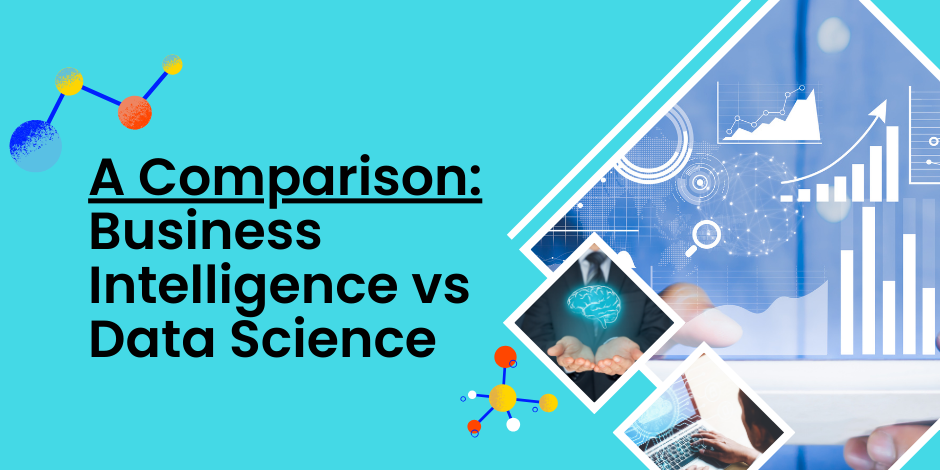Understanding the Distinction: Business Intelligence vs Data Science

Stay Informed With Our Weekly Newsletter
Receive crucial updates on the ever-evolving landscape of technology and innovation.
Business intelligence and data science are terms often used interchangeably in technology and data analysis. However, they are not the same thing.
To fully comprehend the differences between business intelligence vs data science, it is essential to define each term individually.
Defining the key terms: business intelligence vs data science
What is business intelligence?
Business intelligence (BI) refers to gathering, analysing, and visualising data to gain valuable insights that can be used to make informed business decisions.
It involves collecting data, transforming it into actionable information, and presenting it in a way that is easily understandable by decision-makers.
BI focuses on historical and current data, helping organisations track their performance, identify trends, and improve operational efficiency.
It leverages tools and techniques such as data warehousing, data mining, and visualisation to extract insights that drive strategic and operational decision-making.
Business Intelligence has become an integral part of modern business operations.
By harnessing the power of data, businesses can gain a competitive edge in the market.
With technological advancements, BI tools have evolved to provide real-time insights, enabling organisations to make timely and accurate decisions.
What is data science?
On the other hand, data science is a multidisciplinary field that combines mathematics, statistics, domain expertise, and computer science to extract knowledge and insights from structured and unstructured data.
It involves using advanced analytics techniques, algorithms, and programming languages to uncover hidden patterns, make predictions, and solve complex problems.
Data scientists employ various tools and technologies to collect, clean, and analyse data from multiple sources, including social media, sensors, and transactional systems.
They explore large datasets, build predictive models, and create data-driven solutions that enhance business performance and drive innovation.
Data science is a rapidly growing field driven by the increasing availability of data and the need for organisations to leverage it effectively.
With the rise of big data and the Internet of Things, the demand for skilled data scientists has skyrocketed.
These professionals play a crucial role in helping organisations make sense of the vast amounts of data generated daily.
The evolution of business intelligence vs data science
The rise of business intelligence
BI has been around for several decades, although it has undergone significant transformations.
In the early days, BI systems were primarily used to generate standard reports and provide basic analytics capabilities.
However, with advanced technologies and data processing capabilities, BI has evolved into a sophisticated discipline beyond traditional reporting.
Today, organisations rely on BI solutions to gain deeper insights into customers, operations, and market trends.
With machine learning and artificial intelligence integration, BI has become more predictive and prescriptive, enabling organisations to make data-driven decisions in real-time.
The emergence of data science
Data science is a relatively new field that has gained traction in recent years due to the exponential increase in data volume and variety.
The availability of cloud computing, big data technologies, and powerful analytics tools has made it easier for organisations to harness the potential of data, leading to the rise of data science as a crucial discipline.
Data scientists are in high demand as they possess the skills to extract insights from complex datasets and drive innovation within organisations.
They are pivotal in identifying patterns, creating predictive models, developing data-driven solutions, optimising business processes and improving customer experiences.
The role of business intelligence in organisations
The strategic importance of business intelligence
BI plays a vital role in helping organisations achieve their strategic goals.
By providing timely and accurate information, BI enables executives and decision-makers to assess performance, identify opportunities, and mitigate risks.
It supports strategic planning, helps businesses gain a competitive edge, and allows them to adapt to changing market conditions.
With BI, organisations can monitor key performance indicators, track market trends, and benchmark against competitors.
It empowers them to make data-driven decisions that align with their business objectives and drive sustainable growth.
The operational benefits of business intelligence
At an operational level, BI enables organisations to streamline processes, improve efficiency, and reduce costs.
Organisations can identify bottlenecks, eliminate redundancies, and optimise workflows by capturing and analysing operational data.
BI also facilitates effective resource allocation by providing insights into using assets, human capital, and other resources.
It helps organisations identify areas of improvement, make informed decisions about resource allocation, and enhance operational performance.
The role of data science in organisations

The strategic importance of data science
Data science has a strategic role in organisations by enabling them to uncover hidden opportunities, drive innovation, and gain a competitive advantage.
With the ability to analyse large and complex datasets, data science empowers organisations to make data-driven decisions that maximise revenue, minimise risks, and optimise business processes.
By leveraging advanced analytics techniques, organisations can identify market trends, predict customer behaviour, and develop innovative products and services.
Data science is also critical in guiding strategic business planning and developing long-term growth strategies.
The operational benefits of data science
Data science offers several operational benefits to organisations.
By analysing vast amounts of data, organisations can improve operational efficiency, enhance predictive maintenance, and achieve higher levels of accuracy in forecasting.
Data science enables organisations to personalise customer experiences, optimise supply chain management, and automate decision-making processes.
By leveraging machine learning algorithms, organisations can automate routine tasks, reduce human error, and improve productivity.
Comparing business intelligence vs data science

Similarities between business intelligence vs data science
While BI and data science are distinct, they share some similarities.
Both disciplines rely on data analysis techniques and tools to extract insights from raw data.
They both aim to provide valuable information to organisations that can be used for decision-making purposes.
BI and data science involve statistical methods, visualisation techniques, and programming languages to analyse and interpret data.
Furthermore, both disciplines require professionals with a strong analytical mindset and a sound understanding of the underlying principles.
Differences between business intelligence vs data science
Despite the similarities, there are significant differences between business intelligence vs data science.
The main distinction lies in their goals and the level of sophistication required.
BI primarily provides insights and reports based on historical and current data.
It is used to facilitate operational decision-making and track key performance indicators.
In contrast, data science leverages advanced analytics techniques and machine learning algorithms to uncover patterns, make predictions, and optimise business processes.
Another difference is the level of complexity involved.
Business intelligence typically deals with structured data from internal systems, while data science often works with unstructured and semi-structured data from various sources.
Additionally, the skill sets required for these disciplines differ. BI professionals need a strong understanding of data modelling, data warehousing, and reporting tools.
On the other hand, data science professionals require a deeper understanding of statistics, machine learning algorithms, and programming languages.
Conclusion
Business intelligence and data science are two distinct disciplines that play vital roles in organisations.
While BI focuses on historical and current data to provide insights for decision-making, data science leverages advanced analytics techniques to uncover patterns and make predictions.
Understanding the distinction between business intelligence vs data science is crucial for organisations looking to harness the power of data and gain a competitive advantage in today’s data-driven world.
So, next time you come across these terms, you can differentiate business intelligence vs data science, their scope and understand how they can benefit your organisation.
Ready to dive into the world of data science?
The Institute of Data’s Data Science & AI programme offers expert instructors, hands-on projects, and an industry-relevant curriculum to equip you with the tools today’s tech employers seek.
Choose us as your learning partner to nurture your passion and join a supportive network of professionals today.
Want to learn more about our programmes? Contact our local team for a free career consultation.





